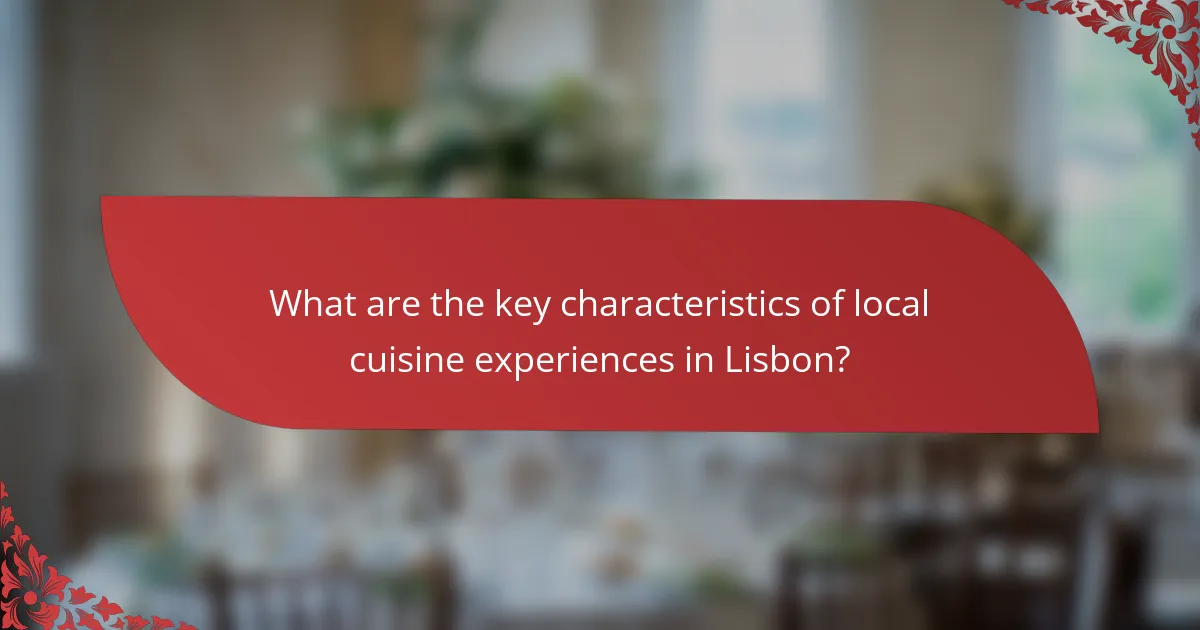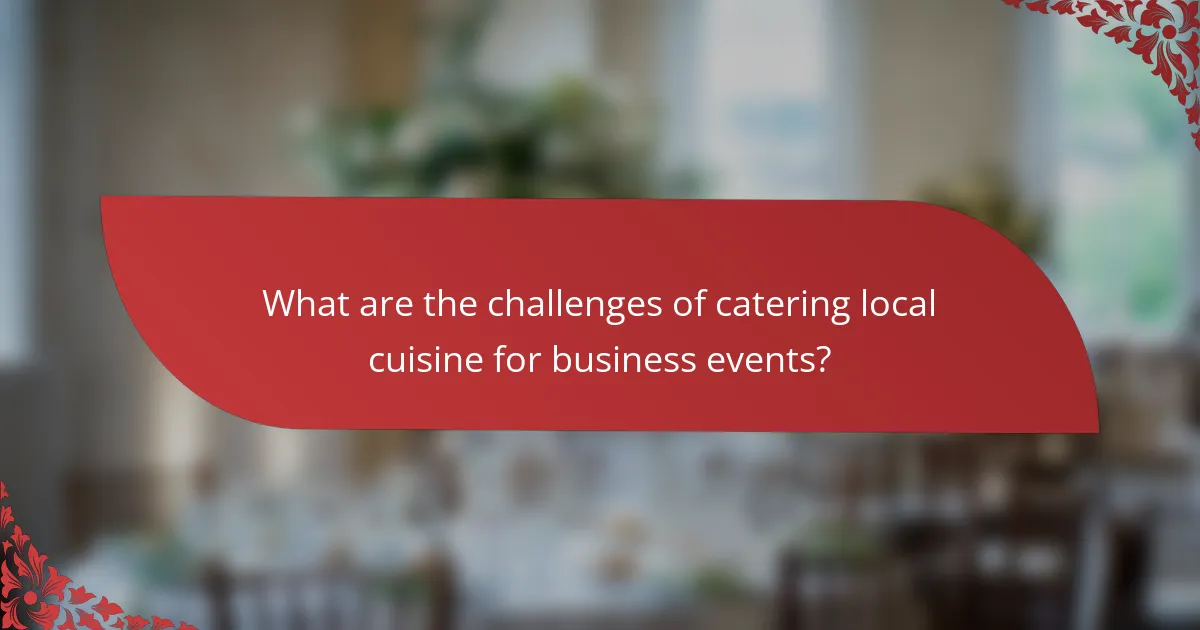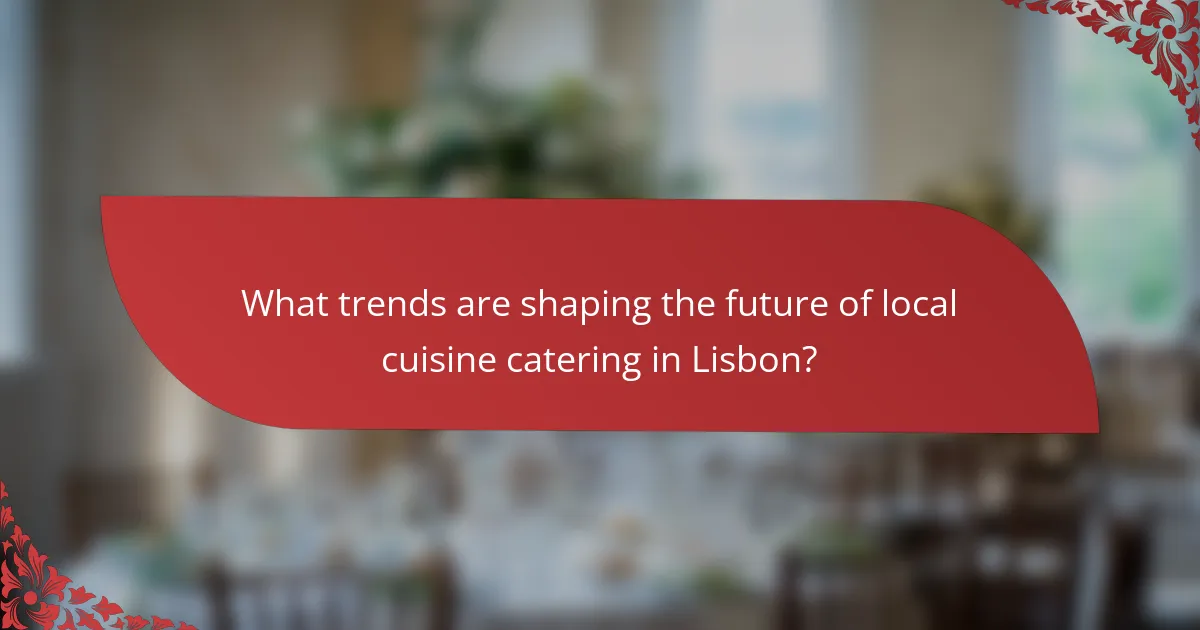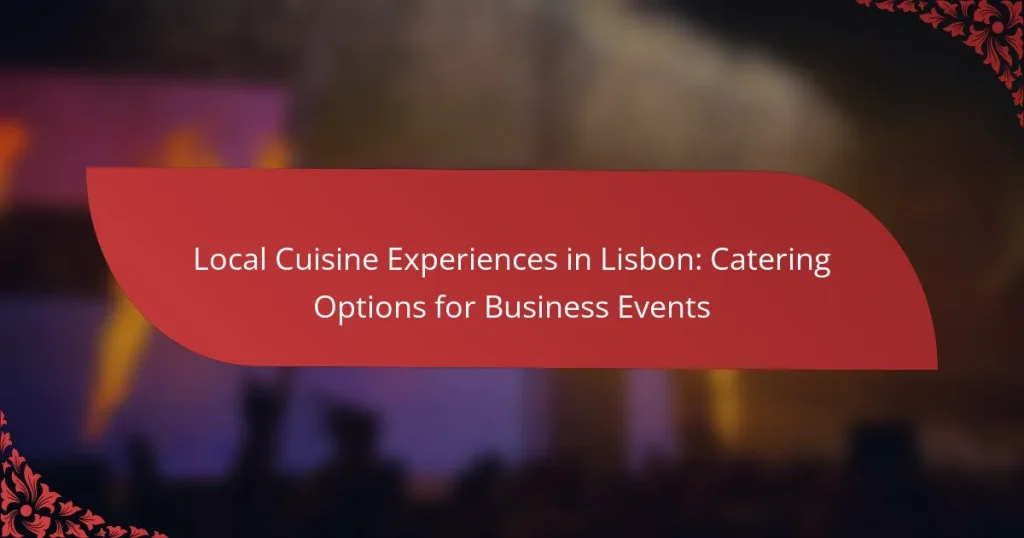Local cuisine experiences in Lisbon provide unique catering options that enhance business events. Traditional Portuguese dishes, local wine pairings, and interactive cooking classes create memorable dining experiences. Catering services emphasize fresh ingredients and customizable menus to accommodate dietary needs. Incorporating local flavors not only delights guests but also promotes sustainability and supports the community.

What are the key characteristics of local cuisine experiences in Lisbon?
Local cuisine experiences in Lisbon offer diverse catering options that enhance business events. Key characteristics include regional dishes, fresh ingredients, and traditional cooking methods. These experiences often feature local wines and desserts, providing authentic flavors. Additionally, customizable menus cater to various dietary needs, ensuring inclusivity for all guests. The atmosphere is typically informal, encouraging networking and engagement among attendees.
How does local cuisine reflect cultural heritage and traditions?
Local cuisine in Lisbon showcases cultural heritage and traditions through unique flavors and cooking methods. Traditional dishes often reflect historical influences, such as Moorish spices and maritime ingredients. Events featuring local cuisine offer authentic experiences, enhancing business gatherings. Catering options can include iconic dishes like bacalhau and pastéis de nata, promoting local culture. This culinary diversity enriches the understanding of Lisbon’s vibrant history and community values.
What are the most popular dishes for business events?
Popular dishes for business events in Lisbon include bacalhau à brás, pastéis de nata, and assorted petiscos. These options showcase local flavors and cater to diverse tastes.
1. Bacalhau à brás – A traditional codfish dish with potatoes and eggs.
2. Pastéis de nata – Iconic custard tarts, perfect for dessert.
3. Assorted petiscos – Small plates featuring local cheeses, olives, and cured meats.
4. Grilled sardines – A flavorful seafood choice, ideal for summer events.
5. Caldo verde – A comforting green soup made with kale and potatoes.
6. Arroz de marisco – A seafood rice dish that highlights Lisbon’s coastal cuisine.
Which ingredients are commonly used in Lisbon’s local cuisine?
Lisbon’s local cuisine commonly features ingredients such as bacalhau (salted cod), olive oil, garlic, tomatoes, and fresh seafood. These ingredients reflect the city’s maritime heritage and Mediterranean influences. Seasonal vegetables, herbs like cilantro, and spices enhance the dishes, showcasing the region’s culinary diversity.

What catering options are available for business events in Lisbon?
Catering options for business events in Lisbon include traditional Portuguese cuisine, international menus, and specialized dietary offerings. Local caterers often emphasize fresh ingredients and regional specialties like bacalhau and pastéis de nata. Many services provide customizable packages to suit various event sizes and themes. Options for on-site cooking and interactive food stations are also popular, enhancing the dining experience.
How do traditional catering services differ from modern options?
Traditional catering services focus on classic menus and formal presentations, while modern options emphasize unique local flavors and interactive dining experiences. Traditional services often provide set menus, whereas modern catering allows for customization and flexibility, catering to diverse dietary preferences. Additionally, modern catering frequently incorporates local ingredients, enhancing the authenticity of the cuisine. This shift towards personalized and experience-driven catering reflects changing consumer preferences in Lisbon’s business events.
What are the benefits of choosing local caterers for corporate gatherings?
Choosing local caterers for corporate gatherings offers numerous advantages. They provide authentic culinary experiences that reflect the region’s culture, enhancing guest satisfaction. Local caterers often use fresh, seasonal ingredients, ensuring high quality and flavor. They also have a better understanding of local preferences and dietary restrictions, allowing for tailored menus. Additionally, supporting local businesses fosters community relationships and contributes to the local economy.
Which venues in Lisbon specialize in local cuisine catering?
Several venues in Lisbon specialize in local cuisine catering for business events. Notable options include Time Out Market, which showcases diverse local dishes, and Tascas do Bairro, known for its traditional Portuguese fare. Another option is Lisboa Rio, offering a blend of local and international flavors in a vibrant setting. Additionally, A Cevicheria provides a unique twist with its seafood-focused menu, while O Prego da Peixaria emphasizes fresh, local ingredients. These venues ensure authentic culinary experiences tailored for corporate gatherings.

How can businesses incorporate local cuisine into their events?
Businesses can incorporate local cuisine into their events by collaborating with local caterers and showcasing regional dishes. Choosing traditional Portuguese dishes, such as bacalhau à brás or pastéis de nata, enhances the cultural experience.
Utilizing local ingredients promotes sustainability and supports the community. Organizing cooking demonstrations or tastings can engage attendees and create memorable experiences. Additionally, themed events centered around local cuisine can foster networking and collaboration among participants.
Incorporating local beverages, like Portuguese wines or craft beers, further enriches the culinary experience. This approach not only delights guests but also highlights Lisbon’s rich gastronomic heritage.
What are the best practices for menu planning with local dishes?
To effectively plan a menu featuring local dishes in Lisbon, prioritize seasonal ingredients and traditional recipes. Focus on incorporating popular local specialties such as bacalhau à brás and pastéis de nata. Engage local chefs to ensure authenticity and explore diverse dietary preferences. Consider portion sizes and presentation to enhance the dining experience.
How can local cuisine enhance networking opportunities during events?
Local cuisine can significantly enhance networking opportunities during events by fostering connections through shared experiences. In Lisbon, unique culinary offerings encourage interaction among attendees, creating a relaxed atmosphere conducive to relationship building. Local dishes, such as bacalhau à brás or pastéis de nata, serve as conversation starters, enabling guests to bond over food preferences and cultural insights. Additionally, incorporating local catering options showcases hospitality, leaving a lasting impression that can lead to future collaborations. By emphasizing regional flavors, events can transform into memorable experiences that facilitate meaningful networking.

What unique local culinary experiences can be offered at business events?
Local culinary experiences in Lisbon can enhance business events through unique catering options. These experiences include traditional Portuguese dishes, local wine pairings, and interactive cooking classes.
1. Traditional Portuguese Cuisine: Offer dishes such as bacalhau à brás and pastéis de nata, showcasing authentic flavors.
2. Local Wine Pairings: Incorporate regional wines, including Vinho Verde and Port, to complement meals and enhance the dining experience.
3. Interactive Cooking Classes: Engage attendees with hands-on experiences, allowing them to learn to prepare local dishes under the guidance of expert chefs.
4. Seafood Tastings: Highlight Lisbon’s coastal heritage with fresh seafood options, including grilled sardines and octopus salad.
5. Food Market Tours: Organize excursions to local markets, providing insights into Lisbon’s culinary culture and fresh ingredient sourcing.
6. Dessert Experiences: Feature traditional sweets like bolo de bolacha, creating memorable end-of-meal moments.
How do cooking classes or workshops add value to corporate gatherings?
Cooking classes and workshops enhance corporate gatherings by fostering teamwork and creativity. Participants engage in hands-on experiences, promoting collaboration and communication. These activities also provide a unique opportunity to explore local cuisine, enriching the cultural experience of the event. Additionally, culinary experiences can stimulate conversation and networking among attendees, making the event more memorable.
What are the advantages of food and wine pairing events?
Food and wine pairing events enhance local cuisine experiences by fostering social interaction and culinary exploration. They provide opportunities to taste unique flavor combinations that highlight regional ingredients. Participants gain insights from experts, enhancing their appreciation of food and wine. These events can also boost local businesses and tourism, creating a vibrant community atmosphere.

What are the challenges of catering local cuisine for business events?
Catering local cuisine for business events presents challenges such as ingredient sourcing, dietary restrictions, and presentation. Local dishes may require specific ingredients that are not readily available, complicating logistics. Additionally, accommodating diverse dietary needs, including allergies and preferences, can limit menu options. Finally, achieving an appealing presentation that reflects local culture while meeting professional standards adds another layer of complexity.
How can dietary restrictions be accommodated in local cuisine menus?
Dietary restrictions can be accommodated in local cuisine menus through careful planning and ingredient selection. Chefs can create customizable dishes that cater to various dietary needs, such as gluten-free, vegan, or nut-free options.
Incorporating local ingredients allows for diverse flavors while ensuring safety for those with restrictions. Clear labeling of dishes is crucial for transparency, helping guests make informed choices.
Collaboration with local suppliers can enhance menu options, providing fresh, seasonal ingredients that align with dietary preferences. Training staff on dietary requirements ensures they can assist guests effectively, enhancing overall dining experiences.
Flexibility in menu design encourages creativity, allowing chefs to innovate while respecting dietary needs. This approach not only satisfies individual preferences but also promotes inclusivity in local cuisine experiences.
What logistical considerations should be taken into account?
When planning local cuisine experiences in Lisbon for business events, consider menu diversity, dietary restrictions, and logistics. Prioritize local specialties to enhance authenticity. Ensure catering services can accommodate varying guest preferences and dietary needs. Confirm delivery times and setup requirements to maintain event flow. Evaluate venue capacity to facilitate seamless dining experiences.

What trends are shaping the future of local cuisine catering in Lisbon?
Local cuisine catering in Lisbon is evolving with trends emphasizing sustainability, local sourcing, and unique culinary experiences. These trends reflect a growing consumer preference for authenticity and environmental consciousness.
Sustainability is a key focus, with many caterers adopting eco-friendly practices. This includes using seasonal ingredients and minimizing food waste. Local sourcing enhances freshness and supports regional farmers, creating a stronger connection to Lisbon’s culinary heritage.
Unique culinary experiences are gaining traction as businesses seek to impress clients. Caterers are offering interactive cooking demonstrations and themed events that showcase Lisbon’s rich gastronomy. This approach not only engages guests but also promotes local culture.
Health-conscious options are becoming increasingly popular. Caterers are incorporating plant-based dishes and accommodating dietary restrictions, reflecting the diverse preferences of modern consumers. This trend ensures inclusivity while promoting a healthier lifestyle.
How is sustainability influencing catering practices?
Sustainability is significantly shaping catering practices by prioritizing local sourcing and eco-friendly options. Caterers in Lisbon increasingly focus on using seasonal ingredients from nearby farms, reducing carbon footprints. This trend enhances local cuisine experiences and supports community economies. Additionally, sustainable practices include minimizing waste through composting and using biodegradable materials. These efforts align with growing consumer demand for responsible dining, making sustainability a core aspect of catering for business events.
What role does technology play in modern catering options?
Technology enhances modern catering options by streamlining service and improving customer experiences. Digital platforms enable easy menu customization and real-time ordering. For instance, mobile apps allow clients to select local cuisine dishes efficiently. Additionally, catering management software optimizes logistics, ensuring timely delivery and food quality. Furthermore, innovative cooking techniques and equipment elevate the presentation and taste of dishes, aligning with contemporary culinary trends.
Which emerging culinary trends should businesses be aware of?
Businesses should be aware of the rising trend of immersive local cuisine experiences in Lisbon. These experiences emphasize authentic dishes and regional ingredients, enhancing guest engagement at events.
Sustainability is another key trend, with a focus on locally sourced produce and eco-friendly catering practices. This aligns with consumer preferences for responsible dining options.
Interactive dining experiences, such as live cooking stations, are gaining popularity. They create a dynamic atmosphere and allow guests to engage directly with chefs.
Lastly, dietary inclusivity is essential. Offering diverse menu options that cater to various dietary needs ensures all attendees feel welcome and satisfied.
What are the top tips for successfully integrating local cuisine into business events?
To successfully integrate local cuisine into business events, focus on authenticity, variety, and presentation. Incorporate traditional dishes that reflect Lisbon’s culinary heritage while accommodating dietary preferences. Collaborate with local caterers to ensure quality and freshness. Engage guests with interactive food experiences, such as cooking demonstrations or tastings, to enhance participation and enjoyment.




